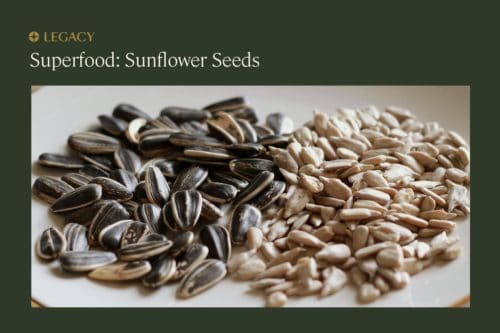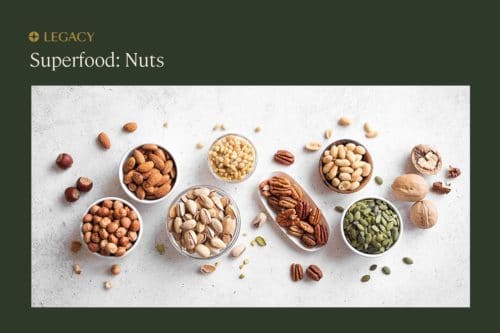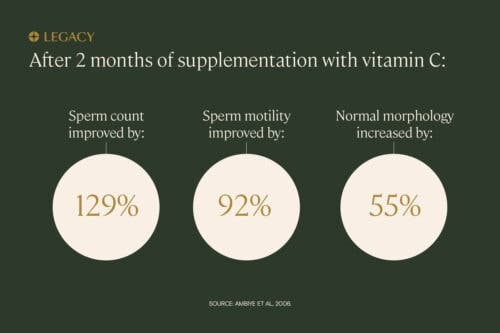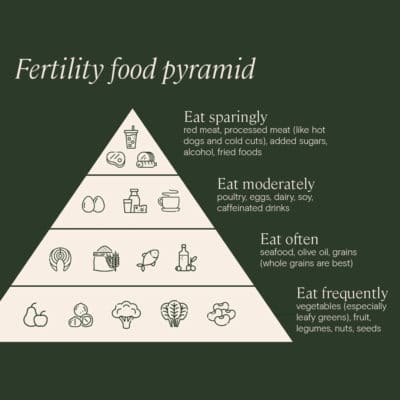When you’re trying to conceive or freezing sperm for later, you want all conditions to be just right. So you get healthy, improve your diet, and cut out the toxins. But can certain “superfoods for male fertility” actually change the quality of your sperm?
Studies do demonstrate that what you eat can improve sperm quality, from count to morphology, improving your chances of conception or providing a better sperm sample for freezing. Let’s take a look at what those “superfoods” are, and why they may help.

Shellfish
The nutrients in shellfish—namely omega-3 fatty acids and zinc—are important for our body’s essential functions, as well as sperm motility. Shellfish include both crustaceans (lobster, crab, shrimp) and mollusks (clams, mussels, oysters, scallops).
Why it’s a male fertility superfood
In a 2019 study of meat consumption’s correlation to sperm quality and reproductive hormones, a the group who regularly consumed shellfish showed the highest progressive sperm motility, more than:
- Organ meats (such as liver)
- Red meat (such as beef)
- White meat (such as poultry)
- Other dark- or white-meat fish
What that means for you
Interestingly, researchers in this study found that shellfish, specifically, had a more significant impact on progressive motility than even other fish—so they don’t believe the omega-3 fatty acids were the only contributing factor. Instead, they point to micronutrients such as zinc, present in shellfish but not in regular fish. We know that oysters, specifically, are one of the most potent sources of zinc.

Fish
That doesn’t mean fish doesn’t have its own benefits. Fish is a great source of vitamin B12, and B12 is essential for creating other essential compounds. Plus, cold-water fatty fish (such as salmon) is packed with omega-3s, which serve as important structural components of sperm cell membranes and enhance antioxidant activity in seminal fluid.
Why it’s a male fertility superfood
A literature review published in 2017 rounded up the studies linking the presence of B12 to better sperm motility and morphology. This review concluded that B12 may:
- improve the overall functionality of reproductive organs
- reduce oxidative stress on sperm
- decrease inflammation-induced semen impairment.
- improve protein absorption necessary for semen production
Plus, a 2010 study explored the relationship between both omega-3 and omega-6 fatty acids—the kind found in vegetable oil—and idiopathic (unexplained) male infertility. Researchers found that infertile men had a higher ratio of omega-6s compared to omega-3s, and that lower levels of omega-3s correlated with decreased sperm quality.
What that means for you
More studies will be necessary to link B12 more strongly to these results. The data available, however, does make a good case for adding fish to your diet.

Leafy greens
Dark, leafy greens, such as kale and spinach, contain a number of vital micronutrients, such as folate (folic acid). Folate, a B vitamin that supports healthy cell division—the process required to produce sperm—could help improve the big three in male fertility: total sperm count, motility, and morphology.
Why it’s a male fertility superfood
In one study, researchers examined 186 subjects with normal sperm parameters and 88 subjects experiencing infertility. They found that for every 1 unit increase in folic acid, there was a 17% decrease in the prevalence of infertility. Folic acid was also associated with improved hormone profiles for male fertility (specifically luteinizing hormone and testosterone).
In another study, researchers looked at general diet patterns from 389 participants over a year, finding that adherence to a diet rich in vegetables—including leafy greens—correlated with greater sperm motility.
What that means for you
If you’re getting plenty of leafy greens in your diet, you’re probably consuming healthier foods in general. This diet pattern shows improvement in motility—and your ability to conceive—over what experts call the “standard American diet,” high in meat, processed foods, and refined sugars.

Sunflower seeds
Antioxidants protect sperm from oxidative stress, a condition produced by poor lifestyle, environmental toxins, or illness that can damage sperm quality and genetic health. One such antioxidant, vitamin E, is found in its highest concentration in sunflower seeds.
Why it’s a male fertility superfood
Animal studies have suggested that animals who are deficient in vitamin E are more susceptible to the adverse effects of environmental agents, and that vitamin E supplementation can protect against oxidative stress and improve sperm motility in rats. Additionally, a small study of sperm in vitro (in the lab) found that adding α-tocopherol, a type of vitamin E, to semen samples improved their vitality and motility.
Other research shows us that vitamin E is most effective alongside other antioxidants, such as selenium or vitamin C. One such study found that, after three months of supplementation with vitamin E and selenium, levels of malondialdehyde—a marker for oxidative stress—were greatly reduced in semen. Another review concluded that taking a combination of vitamin E and vitamin C was extremely effective in reducing sperm DNA fragmentation.
What that means for you
The above studies examined supplementation with high doses—upwards of 300mg—of vitamin E daily, so you may not see the same results by just eating sunflower seeds, which contain about 10mg per serving. However, sunflower seeds also contain 32% of your daily recommended intake of selenium, plus zinc, folate, and healthy fats, making them an all-around powerhouse food for fertility.

Nuts
Go ahead and chuckle—the humor isn’t lost on us. But all joking aside, nuts could pack a serious health punch for your fertility. They’re chock-full of those all-important omega-3 fatty acids, vitamin E, selenium (another micronutrient with antioxidant properties), and other compounds that could improve sperm quality.
Why it’s a male fertility superfood
A 2018 study of nut consumption in a westernized diet put 119 men into two groups. One ate a Western diet supplemented with a 60-gram nut mixture, and the other ate the same diet without supplementation. After 14 weeks, the group eating nuts saw improvement in:
- Sperm count
- Total motility
- Progressive motility
- Vitality
- Morphology
- Sperm DNA fragmentation
On the other hand, the group eating the Western diet without the added nuts saw decreases in most of the above parameters over the 14-week period.
A study in 2012 showed similar results with only walnuts. Recipients eating 75 grams of walnuts in addition to the typical Western diet showed greater vitality, motility, and morphology than the group avoiding tree nuts.
What that means for you
Men consuming nuts improved not just sperm count but overall sperm quality. Added omega-3s, vitamin E, and selenium could be the reason. Together, the addition of these compounds to a healthy diet may even reduce sperm DNA fragmentation.

Bell peppers
Bell peppers contain vitamin A and vitamin C—antioxidants thought to help protect sperm from oxidative damage. Vitamin C, in particular, may increase motility and improve overall morphology.
Why it’s a male fertility superfood
Thirteen patients experiencing infertility received a vitamin C supplement of 1000mg twice daily for two months. At the end of the study:
- mean sperm count increased by 129%
- mean sperm motility increased by 92.6%
- normal morphology increased by 55%

What that means for you
If you aren’t interested in a supplement, bell peppers provide more vitamin C than your average orange, plus other nutrients like folate (see above).
Improving fertility with foods
A decline in sperm quality and count seems to be happening in Western countries faster than the rest of the world. Researchers are interested in what factors may contribute, and evidence hints at the composition of the Western diet itself.
It’s important to note that no study definitively proves that a specific food or nutrient solves infertility issues, so calling these “superfoods for male fertility” may be a misnomer. However, there are plenty of promising studies with results that suggest positive correlations between diet and sperm quality. Supplementing other actions with thoughtful dietary choices could be part of an overall fertility plan to maintain or improve fertility.
Learn more about sperm improvement.

Approaching fertility with confidence
So how do you come to a fertility plan? One of the best things you can do for yourself is sperm testing. With at-home options, you’ll gain a greater understanding of your own fertility—and what you might want to improve—before you begin the conception process.
Sperm testing gives you three big advantages:
- You’ll know in detail the health of your sperm. Testing gives you your sperm count, the motility of your sperm, and a picture of the quality of your sperm. From there, you can make decisions about male fertility supplements or foods to add.
- You’ll have a head start. Starting a family is an exciting decision. If you already have a picture of your fertility and health, you’ll eliminate some of the big “ifs” that come with that decision.
- You’ll know when it’s the right time to freeze your sperm. You may not be ready for a family right now. If you have any existing issues with sperm, testing periodically gives you an idea of when is the best time to freeze a sperm sample for the future.
Lifestyle changes, diet, and supplementation can all be a part of your overall plan to take control of your fertility. Add private at-home testing to the mix, and your fertility becomes a conversation with yourself about your future—instead of a huge guessing game.



